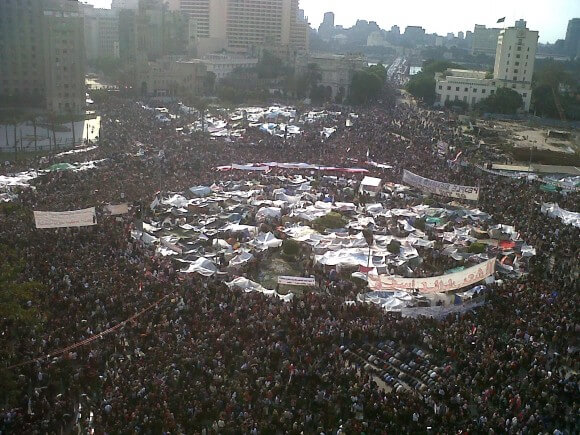
The latest news from Egypt continues to depress. Three years after masses of brave demonstrators filled Tahrir Square, the new military government continues to arrest thousands of innocent people — with the apparent support of a majority of Egyptians. The security forces have also libeled the Muslim Brotherhood as “terrorist,” despite no evidence, outlawed the organization and killed at least hundreds of its members. Even so, the military leader, General Abdul-Fattah el-Sisi, seems widely popular, and he will almost certainly win the next election.
Joel Beinin, a professor at Stanford, is a Middle East expert with years of experience in Egypt, including his studies of the labor movement. He takes a longer-term look, and he is surprisingly optimistic:
[Observers] have concluded that the party is over and have pronounced the failure of the Egyptian revolution. I beg to disagree.
Beinin’s argument is simple but persuasive. First, the 2011 uprising was a response to terrible social conditions and deep structural problems, which include the unequal distribution of power and wealth and massive youth unemployment. Despite General Sisi’s unquestionable popularity, there is little to suggest he has a plausible response to this profound crisis.
Second, the massive protests of the past three years have shown Egyptians they can change their government. Beinin explains:
The most radical achievement of the 2011 uprising is that the Egyptian people, after nearly sixty years when meaningful public participation was banned, found their voices. They removed two presidents through popular street action in the course of two and a half years. It will be very difficult, but not theoretically impossible, to suppress the memory of the millions of Egyptians who were exhilarated by the discovery of their power. Revolutions take many years to unfold.”
There are parallels from Europe, (although Beinin does not mention them). In France, both the revolution of 1789 and the 1848 uprising were followed by Thermidorian reactions that brought strongmen to power to “restore order”: first, the Emperor Napoleon, and then his nephew, Napoleon III.
But the popular advances were not entirely reversed, and after reactionary pauses, the French people pushed on for more democracy.
Only a fool would try and predict Egypt’s future with any precision. But General el-Sisi should enjoy his days in the sun while they last. If in a year, or two, youth unemployment remains astronomical and corruption at senior levels is not checked, Egyptians already know how to find their way to Tahrir Square.


The last opposition newspaper operating in Egypt, El-Shaab, has just been closed down, the interim Prime Minister Al-beblawy said its unprofessional practices and its explicit incitement to violence and terrorism against the state was the reason, they are moving against any opposition, left right and centre, can they get away with it? Well that 12 billion from the GCC countries should last awhile, but then what? I see major trouble ahead. https://www.middleeastmonitor.com/news/africa/9428-egypt-military-backed-government-bans-last-opposition
“is there hope for Egypt”
No. Not this side of the collapse of Zionism.
This is the beginning of the disintegration of Egypt. With thousands of Brothers tucked away in jail, their political party “delegitimized”, their media shut down, how can there be hope?
Read that Gen. Sisi is going to run for President…be ‘installed’ is more like it.
Told ya so.
Lakhbatah gaamidah. Abdel Halim’s People are going through the wringer. Cairo used to send a special cover for the kaaba in mecca by camel train. Pre oil egypt had culture and class. Saudi didn’t. Doesn’t. Jahaliyeh. Saudi Islam is a fraud.